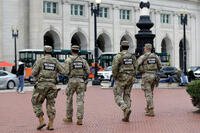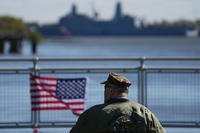The U.S. and Taliban potentially could coordinate in the future against an offshoot of the Islamic State group in Afghanistan responsible for a suicide bombing that killed 13 troops last month, Gen. Mark Milley, the Joint Chiefs chairman, said Wednesday at the Pentagon.
"It's possible," he told reporters during a televised briefing.
But Defense Secretary Lloyd Austin said the U.S. had worked with the Taliban on a "very narrow set of issues" regarding evacuations and cautioned that "it is hard to predict" what that could mean for broader cooperation against the terrorist group known as Islamic State Khorasan, or ISIS-K.
The delicate phrasing from the Pentagon's top leaders underscored the awkwardness of the United States' uneasy cooperation with the Taliban after two decades of war that came to an end when the military completed its evacuation this week. It also showed the Pentagon's concern over ISIS-K's influence and potential threat after the Aug. 26 bombing inflicted the highest U.S. casualties in Afghanistan in a decade.
Read Next: The Navy Shakes Up Its Uniform Policy with New Haircuts as Well as Allowing Earrings for Men
After the Taliban seized Kabul and the U.S. pulled back to the Hamid Karzai International Airport for its final withdrawal, U.S. commanders regularly communicated, and even shared some intelligence on threats to the airport, with Taliban counterparts.
CNN reported Tuesday that the U.S. military also struck a secret deal with the Taliban to escort groups of Americans to the airport so they could be evacuated.
"We don't know what the future of the Taliban is," Milley said. "But I can tell you from personal experience that this is a ruthless group. Whether or not they change remains to be seen. And as far as our dealings with them at that airport, you do what you must."
At Austin and Milley's first briefing since the last U.S. troops flew out of Afghanistan on Monday, they said an investigation into a U.S. drone strike on a vehicle in Kabul on Sunday continues. The military believes the vehicle was carrying explosives bound for another ISIS-K attack on the airport and claims that "secondary explosions" support that belief.
But some Afghans said it killed as many as 10 civilians, including children.
At least one of the people killed in the attack was an ISIS-K figure, making it a valid airstrike, according to the Pentagon. The U.S. had intelligence indicating the group was preparing a vehicle for an attack when it carried out the strike, Milley said.
Austin and Milley praised the 800,000 troops who fought throughout the war. They highlighted the 2,461 who were killed there and the more than 20,000 injured, as well as the 60,000 Afghan troops who died.
They also lauded troops for the largest civilian air evacuation in U.S. history. In all, counting both 387 U.S. C-17 Globemaster III and C-130 Hercules flights and 391 non-U.S. military flights, the airlift ferried out 124,334 people, including nearly 6,000 U.S. citizens.
"We did it all in the midst of a pandemic, and in the face of grave and growing threats," Austin said. "I am incredibly proud of those who made it happen, and they made it happen with grit and skill and humanity."
Austin noted that on the day of the attack, evacuations continued with 89 flights in a 24-hour span, carrying 12,500 people out.
The defense secretary praised "courageous" Afghans who fought with or assisted the United States. "They and their families have more than earned their places in the land of the free and the home of the brave," he said.
Still, the emotional turmoil left in the wake of the war will continue long after its end, said Milley, who lost 242 troops in Afghanistan and Iraq during operational deployments he commanded, and was himself attacked while on patrol.
"This is tough stuff," Milley continued. "War is hard. It's vicious, it's brutal, it's unforgiving. And yes, we all have pain and anger. ... But I'm a professional soldier. I'm going to contain that and continue to execute my mission."
-- Stephen Losey can be reached at stephen.losey@military.com. Follow him on Twitter @StephenLosey.
Related: After Afghanistan: The Legacy of Two Decades of War













